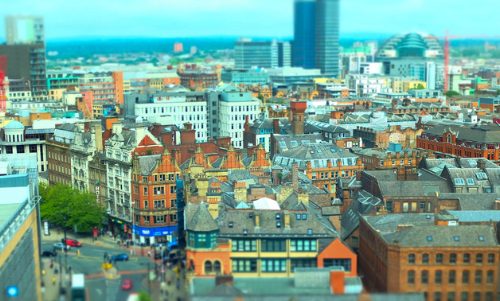Manchester: changing perceptions since the Industrial Revolution
For a city described as ‘Hell upon Earth’ by Friedrich Engels, it may seem that any attempt to pay homage to Manchester is doomed from the start. It is a destination which in many people’s minds conjures up the image of perpetual drizzle, incessant rows of crumbling chimneys and the dubious glamour of Coronation Street.
For a lad born in Bury, best known for its Black Pudding, the sentiment ‘it’s grim up north’ is one with which I’m all too familiar.
Yet somewhere between the slippery cobbles and the grey skyline, there is much more to Manchester. It is by very virtue of its harsh aesthetics that Manchester hides a patchwork of rich history, vibrant culture and not least an endearing spirit, waiting to be explored.
An odyssey through the vast array of what Manchester has to offer must naturally begin with its incredible history. Often credited as being the first modern industrial city, Manchester was the beating heart of the Industrial Revolution, becoming synonymous with progress and innovation.
The abandoned factories that still loom mysteriously across the cityscape remind the visitor just how integral the area’s soot-filled past is in understanding the city of today. Sampling the abundance of museums dedicated to the city’s industrial heritage is thus a rite of passage for any intrigued tourist.
However, it is not only in industrial terms that Manchester demonstrates a tradition of leading the way. The city also gave birth to numerous political movements that have shaped modern Britain.
In 1844, the Rochdale Pioneers opened a store selling food at fair prices in their hometown, unknowingly foregrounding a modern co-operative movement that now has 1.4 million members worldwide.
The city further exemplified its role as a hotbed of subversion when, in 1903, it provided the setting for the founding of the Women’s Social and Political Union under the leadership of Emmeline Pankhurst, a Manchester native and future Suffragette.
These are only two examples of the vast chronology of Mancunian radicalism which has proudly challenged mainstream opinion throughout history.
If such seminal contributions aren’t impressive enough, however, Manchester can also lay claim to some more quirky firsts.
Vegetarianism, waterproofs, lonely hearts columns and UFO landing pads all find their spiritual home in Manchester. From ground-breaking industrialisation, through pioneering social movements, to the trusty ‘Mack’, the saying ‘what Manchester does today, the world does tomorrow’ is far from misguided.
Yet in no other field is Manchester’s penchant for redefining boundaries more prolific than in music. If the city’s venues could tell a story, all would tell of the part they played in creating legendary fertile ground for the emergence of generation-defining bands.
Out of Manchester’s bustling punk scene of the late 1970s came the brutally dark lyrics of Joy Division’s Ian Curtis, later becoming New Order of ‘Blue Monday’ fame, the biggest selling 12-inch record of all time.
Along with Tony Wilson, members of New Order went on to found Factory Records and the Hacienda nightclub, infamous for its sweaty baptism of the ‘Madchester’ rave scene of the 90s.
And who could forget vegetarian contrarian Morrissey? As lead singer of The Smiths, Mozza’s sarcasm and lyrical genius resonated with a generation of Mancunians.
Yet for the romantic in me, who, on hearing the opening riffs to the Happy Mondays anthem Step On, convulses with civic pride, hope is not lost. The music may have gone, but that Mancunian spirit it embodied, of chirpy attitude, convention-defying creativity and steely determination, can still be seen.
From the 1819 massacre at St Peter’s Fields to the fabled Stone Roses gig at Spike Island in 1990, what links these events in Manchester’s history is that same distinct identity of pride, resolve and heart.
What this jewel in the northern crown therefore lacks in looks, it almost certainly makes up for in its captivating personality, which can only be fully appreciated if you stand amongst this redbrick jigsaw and marvel at its stories, characters and immense contribution to Britain, if not the world.
As one of city’s most famous sons, Ian Brown, wryly commented ‘Manchester has everything except a beach’. Come and see for yourself.

Comments